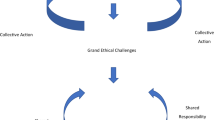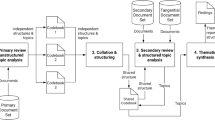Abstract
The paper addresses the question of adaptation of existing regulatory frameworks in the face of innovation in biotechnologies, and specifically the roles played in this by various expert knowledge practices. We identify two overlapping ideal types of adaptation: first, the stretching and maintenance of a pre-existing legal framework, and second, a breaking of existing classifications and establishment of a novel regime. We approach this issue by focusing on varieties of regulatory knowledge which, contributing to and parting of political legitimacy, in principle enable the making of legally binding decisions about risks and benefits of technologies. We base the discussion around two case studies, one of animal biotechnology ethical regulation, the other of ‘advanced therapy’ medicinal product regulation, both in the context of European Union frameworks. Specifically, we explore the knowledge configurations constituting expert committees and other institutional formations of expert regulatory knowledge in their political context. We show that where sectoral and moral boundaries are challenged, different modes of regulatory knowledge beyond scientific forms – legal, procedural, moral, economic and industrial – can shape regulatory innovations either by maintenance of regimes through commensuration and stretching, or through differentiation and separation creating new frameworks. We conclude that establishing an essential techno-scientific difference between pre-existing and novel technologies does not in itself require new regulatory structures, and that the regulatory strategy that is followed will be determined by a combination of different forms of knowledge.
Similar content being viewed by others
Notes
Regulation (EC) No 1394/2007 of the European Parliament and of the Council of 13 November 2007 on advanced therapy medicinal products and amending Directive 2001/83/EC and Regulation (EC) No 726/2004, OJ L 324 (ATMP Regulation).
For more thorough analysis which includes the legislative procedure, we refer to Poort (2013), chapters 5, 6 and 7.
References
Bloor, Michael, Helen Sampson, Susan Baker, and Katrin Dahlgren. 2014. The instrumental use of technical doubts: Technological controversies, investment decisions and air pollution controls in the global shipping industry. Science and Public Policy 41(2): 234–244.
Brown, Nik, and Mike Michael. 2004. Risky creatures: Institutional species boundary change in biotechnology regulation. Health, Risk & Society 6(3): 207–222.
Brown, Nik, Alex Faulkner, Julie Kent, and Mike Michael. 2006. Regulating Hybrids: ‘Making a Mess’ and ‘Cleaning Up’ in Tissue Engineering and Transpecies Transplantation. Social Theory & Health 4(1): 1–24.
Brownsword, Roger. 2008. So what does the world need now: Reflections on regulating technologies. In Regulating Technologies: Legal Futures, Regulatory Frames, and Technological Fixes, eds. Roger Brownsword, and Karen Yeung, 23–48. Oxford and Portland: Hart Publishing.
Collins, Harry M., and Robert Evans. 2002. The third wave of Science Studies. Social Studies of Science 32: 235–296.
Demortain, David. 2017. Expertise, Regulatory Science and the Evaluation of Technology and Risk: Introduction to the Special Issue. Minerva 55(2). doi:10.1007/s11024-017-9325-1.
Dworkin, Richard. 1993. Law’s Empire. Cambridge: Harvard University Press.
EU Monitor. 2005. Explanatory Memorandum to COM(2005)567—Advanced therapy medicinal products. https://www.eumonitor.eu/9353000/1/j4nvhdfdk3hydzq_j9vvik7m1c3gyxp/vi8rm2zzvuvs#p2. Accessed May 2016.
Errass, Christoph. 2006. Öffentliches Recht der Gentechnologie im Ausserhumanbereich. Bern: Stämpfli Verlag AG Bern.
Faulkner, Alex, Julie Kent, Ingrid Geesink, and David FitzPatrick. 2006. Purity and the dangers of regenerative medicine: Regulatory innovation of human tissue engineered technology. Social Science & Medicine 63: 2277–2288.
Faulkner, Alex. 2012a. Commensuration and Proliferation: Similarity and Divergence in Law’s Shaping of Medical Technology. Law, Innovation and Technology 4(2): 165–184.
Faulkner, Alex. 2012b. Tissue engineered technologies: Regulatory pharmaceuticalisation in the European Union. In Steering Biomedicine: regulatory dynamics of therapeutic technologies in Europe. Special Issue of INNOVATION: the European Journal of Social Science Research 25(4): 389–408.
Faulkner, Alex. 2012c. Law’s performativities: Shaping the emergence of regenerative medicine through European Union legislation. Social Studies of Science 42: 753–774.
Fuller, Lon L. 1969. The Morality of Law. New Haven: Yale University Press.
Fuller, Lon L. 2001. The Principles of Social Order, Selected Essays of Lon L. Fuller, ed. with an introduction by Kenneth I. Winston. Oxford: Hart Publishing.
Jasanoff, Sheila. 2003. Accountability. (No?) Accounting for expertise. Science and Public Policy 30: 157–162.
Jasanoff, Sheila. 2015. Serviceable Truths: Science for Action in Law and Policy. Texas Law Review 93(7): 1723–1749.
Hisschemöller, Matthijs, and Rob Hoppe. 1995. Coping with Intractable Controversies: The Case for Problem Structuring in Policy Design and Analysis. The International Journal of Knowledge Transfer and Utilization 8(4): 40–60.
Holmberg, Tora, and Malin Ideland. 2012. Secrets and lies: “selective openness” in the apparatus of animal experimentation. Public Understanding of Science 21(3): 354–368.
Latour, Bruno. 2010. The making of law: An ethnography of the Conseil d’Etat. Cambridge: Polity.
Liberatore, Angela, and Silvio Funtowicz. 2003. ‘Democratising’ expertise, ‘expertising’ democracy: What does this mean, and why bother? Science and Public Policy 30: 146–150.
Mahalatchimy, Aurelie, Emmanuelle Rial-Sebbag, Virginie Tournay, and Alex Faulkner. 2012. The legal landscape for Advanced Therapies: material and institutional implementation of European Union rules in France and the UK. Journal of Law and Society 39(1): 131–149.
Poort, Lonneke M. 2013. Consensus and Controversies in Animal Biotechnology. An Interactive Legislative Approach to Animal Biotechnology in Denmark, Switzerland, and the Netherlands. Den Haag: Eleven International Publishing.
Poort, Lonneke M., Tora Holmberg, and Malin Ideland. 2013. Bringing in the controversy: Re-politicizing the de-politicized strategy of ethics committees. Life Sciences, Society and Policy 9(11): 1–13.
Rial-Sebbag, Emmanuelle, and Anne Cambon-Thomsen. 2012. The Emergence of Biobanks in the Legal Landscape: Towards a New Model of Governance. Journal of Law and Society 39(1): 113–130.
Ross, Alf. 2004. On Law and Justice. New Jersey: The Lawbook Exchange Ltd.
Tamm, Ditlev. 1996. The Danes and Their Legal Heritage. In Danish Law in European Perspective, eds. Børge Dahl, Torben Melchior, and Ditlev Tamm, 41–60. Holmes Beach, FL: Wm Gaunt & Sons.
Selznick, Philip. 1992. The moral commonwealth. Social theory and the promise of community. Berkeley, CA: University of California.
Stokes, Elen. 2012. Nanotechnology and the Products of Inherited Regulation. Journal of Law and Society 39(1): 93–112.
Van der Burg, Wibren, and Frans W.A. Brom. 2000. Legislation on Ethical Issues: Towards an Interactive Paradigm. Ethical Theory and Moral Practice 3(1): 57–75.
Author information
Authors and Affiliations
Corresponding author
Rights and permissions
About this article
Cite this article
Faulkner, A., Poort, L. Stretching and Challenging the Boundaries of Law: Varieties of Knowledge in Biotechnologies Regulation. Minerva 55, 209–228 (2017). https://doi.org/10.1007/s11024-017-9326-0
Published:
Issue Date:
DOI: https://doi.org/10.1007/s11024-017-9326-0




